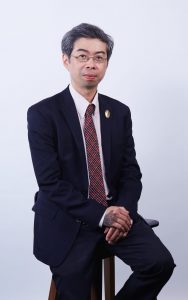
Sarun Sumriddetchkajorn ’00, Ph.D., has built an impressive career in optics and photonics following his doctorate graduation in 2000. In an interview with CREOL, the College of Optics and Photonics, Sumriddetchkajorn shares his career path and advice for current students.
(Answers edited for clarity and length.)
CREOL: What started your path toward optics and photonics?
Sumriddetchkajorn: It was my first job interview at National Electronics and Computer Technology Center (NECTEC) in Thailand in 1994, just after I just finished my degree in electrical engineering. My former supervisor showed me several embossed rainbow holograms, explained briefly how to fabricate them and told me my background in electrical engineering could apply to this field. So, that induced me to think about studying abroad in optics and photonics.
CREOL: What are some experiences or professors that stand out from your time at UCF?
Sumriddetchkajorn: As optics and photonics was new for me at the time, all professors at CREOL stood out for me. I remember walking along the corridors to see and learn things from all the posters in front of the labs, although I didn’t understand most of them. All professors at CREOL were also very welcoming, gave me very good advice, cheered me up and supported me in receiving recognitions from The Optical Society (OSA) and The International Society for Optics and Photonics (SPIE).
To be more specific, one who stood out was my former advisor, Professor Nabeel Riza. He taught me and his team how to do research and to see/learn things around you. For all of my work toward my Ph.D., I had to study all related works in scientific publications, patents, and products, and then convince him that our ideas were new or had some scientific or engineering advantages. If he agreed, I went to the lab and proved it.
My friends during my study at CREOL, either senior or junior than me, were fantastic. This also leads me to plan setting up chapters of OSA, SPIE, and IPS in my native Thailand upon my return. Some of us played soccer together, and we even had a basketball team named “Sarun.”
CREOL: Was there a moment that confirmed you chose the right career path?
Sumriddetchkajorn: I had fun and was happy about what I was learning during my first job at NECTEC and during my studying at CREOL. Those feelings are still with me today in connection with what I have been working on or involved in.
CREOL: Tell me about what you do now at the National Electronics and Computer Technology Center (NECTEC).
Sumriddetchkajorn: The goal of NECTEC is to do research, development and engineering that elevates Thailand’s economy and quality of life. We not only do the publications, but also try to patent and build prototypes with clear technology readiness levels. This will help NECTEC see which works are ready to push forward and scale them up for commercialization or for supporting society. With this point of view, my research work combines optics and photonics, electronics and computer programming so that we have ideas and can build some prototypes to answer the needs from government or private sectors. As I am now a Research Fellow, I strongly inspire and support new generations to start their projects (e.g., quantum plasmonic sensors, quantum random generators, surface enhanced Raman scattering chips, and THz detectors) as well as to help them convince management or policy teams about the important of their works to get more support.
Due to COVID-19, the current work is licensed to a local company is called MuTherm-FaceSense (MTFS). It is a thermal imaging-based mass human temperature screening system. We added LiDAR and electronic temperature sensors to our previous idea in order to compensate for the influence of measuring distance and ambient temperature disturbance. Last year, we built 40 MTFSs and donated them to COVID-19 risk places in Thailand.
I am also involved in big projects linked to Thailand’s government. These projects, initiated two years ago when I became NECTEC director, use big data and artificial intelligence to alleviate the Thai people’s poverty
CREOL: What do you find rewarding about your job?
Sumriddetchkajorn: I see the new generations are growing in quality, maturity and capability.
CREOL: What are some of the challenges of your job, and how do you overcome them?
Sumriddetchkajorn: Convincing stakeholders, in particular to politicians, is challenging. One simple way to overcome this is to use simple words and link the things that you would like to tell them to their interests or the needs of the country.
CREOL: What are some achievements you are proud of?
Sumriddetchkajorn: Finishing my Ph.D. and receiving recognitions from OSA, SPIE, and IPS are still what I am proud of today, and the works of my research teams and NECTEC are well accepted by Thai government and society.
CREOL: What advice do you have for students starting out in optics and photonics?
Sumriddetchkajorn: You have to love optics and photonics. Once you are in love with it, you will learn and study happily.